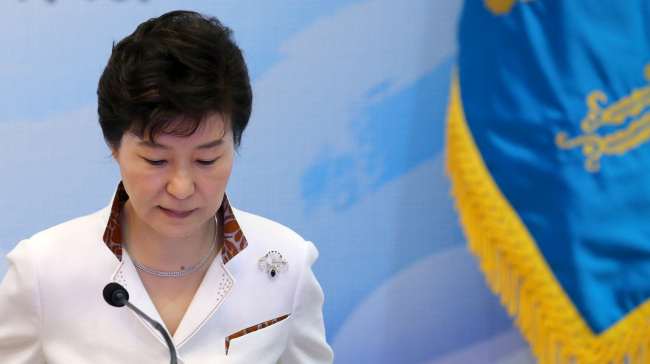President Park Geun-hye on Friday stressed the need to provide medical assistance to North Korea to tackle infectious illnesses such as tuberculosis and rubella and map out a longer term disease management plan in cooperation with other neighbors.

She also said the two Koreas ought to work together to cope with climate change, natural disasters and other common challenges, urging Pyongyang to respond to Seoul’s efforts to foster practical cooperation and private-level exchanges.
“We should explore mid- and long-term solutions on disaster management, starting with providing vaccines and antibiotics to stave off tuberculosis and rubella among North Korean people,” Park said during a meeting with civilian members of a presidential panel on unification preparations.
“The two Koreas can contribute to making a more vigorous and safer northeast Asia if they put their heads together for health and medical cooperation, set up a collaboration mechanism on disaster management with China, Japan, Russia, Mongolia and other neighbors, and nurture the related labor force,” she added.
The president’s remarks follow her pledge to ramp up humanitarian aid to the impoverished country, unveiled during a speech in the German city of Dresden in March 2014.
Last year, the Unification Ministry said it would funnel $13.3 million to help fight acute malnutrition among infants and mothers in the North in partnership with the U.N. World Food Program and World Health Organization. The “1,000 days” project is designed to provide health care to some 2.4 million women and their children up to age 2.
It is also in line with Park’s ambitious initiative to boost peace, cooperation and trust in northeast Asia, beginning with climate change, antiterrorism and other nonpolitical matters, and ultimately progressing to security partnerships.
During the session, she also introduced Seoul’s drive to devise a resolution to better prevent and respond to natural calamities with the communist neighbor such as through joint river management and reforestation, saying the two countries have a “common duty” to keep the peninsula “healthy.”
Yet the efforts have been dogged by Pyongyang’s aloofness and continuing military and political threats, as well as the administration’s unrealistic vision and flip flops on North Korea policy.
“Last year, we put forward various initiatives to open the path for practical inter-Korean cooperation, but North Korea has yet to answer,” Park said.
She called for the Kim Jong-un regime to change course and take lessons from Iran and Cuba, the U.S.’ old foes that are seeking respectively to put their ties with Washington back on track.
“Those cases show that change and cooperation are the prevailing trend in the international community,” the president added.
“We are waiting for North Korea to come to the dialogue table, leaving open the door for talks and cooperation. We should heal the wounds of the division and lay the groundwork for a peaceful unification before it’s too late.”
By Shin Hyon-hee (heeshin@heraldcorp.com)








![[Graphic News] More Koreans say they plan long-distance trips this year](http://res.heraldm.com/phpwas/restmb_idxmake.php?idx=644&simg=/content/image/2024/04/17/20240417050828_0.gif&u=)
![[KH Explains] Hyundai's full hybrid edge to pay off amid slow transition to pure EVs](http://res.heraldm.com/phpwas/restmb_idxmake.php?idx=644&simg=/content/image/2024/04/18/20240418050645_0.jpg&u=20240419100350)





![[From the Scene] Monks, Buddhists hail return of remains of Buddhas](http://res.heraldm.com/phpwas/restmb_idxmake.php?idx=652&simg=/content/image/2024/04/19/20240419050617_0.jpg&u=20240419175937)

![[KH Explains] Hyundai's full hybrid edge to pay off amid slow transition to pure EVs](http://res.heraldm.com/phpwas/restmb_idxmake.php?idx=652&simg=/content/image/2024/04/18/20240418050645_0.jpg&u=20240419100350)

![[Today’s K-pop] Illit drops debut single remix](http://res.heraldm.com/phpwas/restmb_idxmake.php?idx=642&simg=/content/image/2024/04/19/20240419050612_0.jpg&u=)